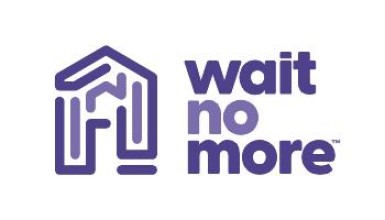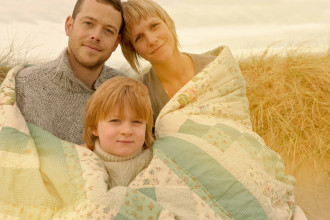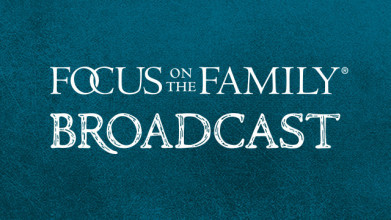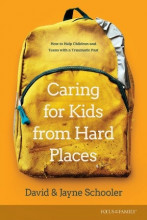John Fuller: Today on Focus on the Family with Jim Daly, we’ll explore some of the unusual challenges facing parents in foster care.
Julie Bagamary: And I said to him, “I’m gonna go out. I’m gonna go meet with these people, who he knew, and, you know, I’ll be back at 9:00.” And he just lost it.
Jim Daly: Had a meltdown?
Julie: He was, he w- … Definitely a meltdown. And he asked me, “What day?” And I didn’t know what he meant. He … What he meant was, “What day at 9:00 was I, was coming back.”
John: Mm-hmm.
Julie: Because he had been abandoned, you know, for days on end as a child. And I- I didn’t foresee that happening. Um, that night in particular, um, his bedroom window was near where I backed my car in and he peeked out the window, and I was home on time. I was very thankful for that, because he was waiting.
John: That’s Julie Bagamary describing her experience as a foster care mom. And since May is National Foster Care Month here in the US, we’ve invited, uh, this 12-year veteran to share more of her stories and insights with us. Thanks for joining us. I’m John Fuller and your host is Focus president and author, Jim Daly.
Jim: John, this is one of those topics that, uh, usually isn’t top of mind, unless you’ve been a foster child, like I was, or you foster children, uh, which Jean and I later did. I remember coming home and saying to Jean … Actually, she said to me, “You know, if you’re gonna ask other couples to do foster care, we should do it.” And I was like, “No, no. I was a foster kid.”
Julie: (laughs).
Jim: I already paid my- my dues.
John: Mm-hmm.
Jim: And she gave me that eye (laughs), you know the awesome eye?
John: Thank the Lord for a Godly wife, right?
Jim: “Like, I don’t even know what you’re talking about, Jim.”
John: (laughs).
Jim: So, we got licensed, we did it and we had, you know, probably 15 kids-
John: Mm-hmm.
Jim: … through the home. I think we had two sets of siblings. One set for three years. So, it’s a big commitment and we’re gonna talk about that commitment today.
John: Yeah.
Jim: When you look in the US, there’s about 400,000 children in the foster care system. In Canada, that number’s about 30,000. And those … That’s the total number. And then within that group, they’ll be a subset where the courts have terminated parental rights. So, they’re wards of the state. They’re just waiting to-
John: Yeah.
Jim: … find a forever home, as we like to call it.
John: Mm-hmm.
Jim: And I’m really proud of the team here, Dr. Sharen Ford, who leads our effort. Wait No More is what we call it and that is to help children find that home-
John: Mm-hmm.
Jim: … that they can eventually live in and hopefully be adopted.
John: Mm-hmm. Yeah. We’re looking forward to the conversation today with Julie, and later on in the program we’ll also hear from Dr. Ford. It’s our hope that maybe your family will feel called to get involved in this space. And the basis for our discussion today is a book that Julie Bagamary wrote called Foster Parenting Matters: Creating a Home for Hope and Healing. Learn more about that at focusonthefamily.com/broadcast. And I should mention, Jim, that, uh, Julie is our first mixed media textile artist. And, uh, we’ve had a lot of people from a variety of backgrounds. She’s very well known for her quilts and her wall-hangings.
Jim: That’s outstanding.
John: Yeah.
Jim: Julie, welcome to Focus.
Julie: Thank you so much. I’m honored to be here.
Jim: That is so good. I- I didn’t understand that quilting background. Tell me about that.
Julie: Oh, I- I have been interested in textiles all my life. My grandmother lived with us and she quilted. I had a week, one week with my granny and she taught me to hand quilt.
Jim: Yeah.
Julie: And it’s just kind of, um … It’s my thing. It’s my creative outlet and-
Jim: Yeah, that’s so good. You know, this little sidebar that we’re doing right now, but we have a quilting kit that, uh, moms or grand-moms and- and daughters-
Julie: Oh.
Jim: … can do together. And then, we encourage them to give those to the Pregnancy Resource Centers-
John: Mm-hmm.
Jim: … for newborn babies. So, there’s-
Julie: I love that.
Jim: … a little thing.
John: Yeah.
Jim: If you want to know more about it, call us. I don’t have all the details, neither does John.
John: I don’t, but we’ll link over to that.
Jim: This is totally off the cuff.
John: Yeah.
Jim: But, uh, yeah, I’m looking forward to it.
Julie: Mm-hmm.
Jim: Uh, Julie, let’s get into it. You and Randy were foster parents for like 12 years, right about that. And you’re very open and honest about both the good and the bad days. We experience those too. I mean, kids of all stripes come into your home if you’re fostering and, uh, some kids come with a lot of pain, a lot of baggage. Um, I guess the bottom line question right at the beginning here is, why do it?
Julie: Bottom line is that God called us to do it.
Jim: Well, that’s a go- good reason to do something.
Julie: (laughs). Um, and, well, Hurricane Katrina happened in 2005 and our church was involved helping take, send water and go down and do things. And we didn’t feel called to do any of that. And after a few days, you know, I said to Randy, “I don’t know what we’re supposed to do. You know, I want to do something. And, um, I don’t want to just give money.” And, um, he said, “Well, I’ve been thinking about maybe, um, adopting some of the kids whose parents have died in the hurricane.”
Jim: Wow.
Julie: And I thought, “Let’s give money.” (laughs).
Jim: (laughs).
Julie: Um, but that began a process of, um, the Lord just really dealing with my heart. I did not, um, give in easily to my discredit.
Jim: Oh, no. I mean, I think it’s normal frankly, because it’s very disruptive, to be honest.
Julie: Mm-hmm.
Jim: I mean, again, I’ve got that experience. You and Dena, John, have that experience too.
John: Through adoption, yeah.
Jim: Yeah.
Julie: Mm-hmm.
Jim: And so, you know, it- it usually does cost you in some way. I mean, it’s not an easy thing-
Julie: Uh-huh.
Jim: … to bring kids in that have had difficulties, et cetera-
Julie: Right.
Jim: … where they’ve lost their parents. I mean, for whatever reason.
Julie: Right.
Jim: It could be the drugs. Drugs is- is a big reason that- that so many kids are entering the foster care system now. So, now, uh, fostering, eh, there’s different ways people can get involved. But fostering is one, where you take kids in for a- a period of time. It’s not always known because the parents or parent are trying to get back on track, and so you take these kids in maybe for days, maybe for weeks, months, or sometimes even years. Um, how did you ready your emotions for that kind of an assignment?
Julie: I don’t know that I did a really good job (laughs)-
Jim: Right.
Julie: … in that. I was all over the place. You know, I- I … When I finally surrendered to the Lord, I, um, I was scared. I was excited. I was hopeful. I was, um, frustrated. I mean, there was also a part of … We were empty nesters, so it meant giving up what we had looked forward to to kind of be our time.
Jim: Mm-hmm.
Julie: And so, um, my emotions were all over the place. And- and really sometimes from minute-to-minute. You know, I-
Jim: Yeah. Did you have a- a, like a timeline in mind that you would do this for a year or two, or were you thinking it’s pretty open-ended? How’d you go into it, you and Randy?
Julie: Well, the caseworker that we had, um, when we met with him, um, he said, “Well, we needed to be foster parents first, because they’re not just gonna give you a child to adopt.” (laughs).
Jim: Right.
Julie: Which … So we- we went through that process to become foster parents. And we did respite. We did a lot of respite. And, you know, just kept praying, “Lord, show us, you know, which- which-
Jim: Yeah.
Julie: … child that you wanted us to adopt.” We didn’t go into it wanting to be foster parents. We went into it wanting to adopt.
Jim: Yeah, but what a good … You know, it is good to I think do some fostering ahead of time.
Julie: Oh, absolutely.
Jim: The respite care, uh, you know, I use that term now because I’m aware of it and we did that. But before that-
Julie: Mm-hmm.
Jim: … I didn’t know what that meant-
John: Yeah.
Jim: … when somebody would say, “Respite care.”
Julie: Me neither.
Jim: I thought, “Is that end of life? What?”
Julie: (laughs).
Jim: But no, respite care is when you, uh, come alongside a foster family or an adoptive family and you give them support, maybe do grocery shopping for them, or watch the kids for a day while the family can do some other things. So, that’s just providing respite care. Some interesting data on that. They found that, uh, for every foster parent or adoptive parent, um, five respite providers is a good number for them to have.
John: Mm-hmm.
Jim: And I- I thought, “Wow, that’s really … That’s good.” Great thing for a church to do, if you want to get involved as a church.
John: Mm-hmm.
Jim: I remember Jean and I when we had two of our foster kids, eh, it was hard to find respite care.
Julie: Oh, it’s so … Yes.
Jim: Which means, uh, you know, we couldn’t get a break. You know, if we had to go somewhere on Focus business even, it became more difficult for Jean to travel because we couldn’t find qualified respite providers to leave the foster care-
John: Mm-hmm.
Jim: … kids with. So, anyway, let me ask you this. You- you really stress the importance in the book about having a like-minded group of therapists, physicians, et cetera who can work with you. And I think that’s becoming more critical now, because world view matters.
Julie: Mm-hmm.
Jim: Um, even in this area of foster, foster adoption, uh, some Christian agencies are finding it very difficult to work with Christians exclusively because the state who licenses you, uh, tends to want a wider acceptance of family-type.
John: Mm-hmm.
Jim: Which is difficult for Christians to, uh, move toward. You know, same sex adoption, all kinds of things.
Julie: Right.
Jim: And, uh, and some states now are beginning to screen off Christian, uh, families, because they don’t want to work with them-
John: Yeah.
Jim: … because of their religious bias-
Julie: Wow.
John: Mm-hmm.
Jim: … which is amazing. I’ve had so many people in foster care say the best families for these kids are Christian families.
Julie: Absolutely.
Jim: There’s just not enough of them.
John: Uh-huh.
Julie: Right.
Jim: Which is a little bit of an indictment to all of us, you know?
John: Yeah.
Jim: It- it … The numbers are not … They’re big, but they’re not not doable.
John: Mm-hmm.
Jim: If I can use a double negative. Just the fact that we have 400,000 in the US and we have, uh, 400,000 churches roughly in the US. It’d just be one child per s- church-
John: Mm-hmm.
Jim: … if we all did that.
Julie: Right.
Jim: But-
Julie: We- we- we found too though that- that they wanted you to be a Christian family, but they didn’t want you to be like Jesus loving Christian people.
John: (laughs).
Jim: What is … I don’t even know the difference.
Julie: You know, it w-
Jim: But, yeah.
Julie: Well, but, I think what that translated to was that they wanted you to be a good safe home, but let’s not bring too much relationship with the Lord into that.
Jim: Yeah.
Julie: And that was an issue for us.
Jim: Yeah, and it should be. You know, it’s unfortunate that the state hems people in that way, because then you have that issue to talk about. But go back for a minute about the importance … You actually have a story, I think, about some of the difficulty you had with therapists that you were working with-
Julie: Mm-hmm.
Jim: … with your foster kids.
Julie: Well, we had, um, we had a- a young girl in our home that, um, we didn’t, we didn’t always realize that we had the, um, the opportunity to choose our own therapist. And we had a caseworker who told us a particular therapist that we had to use. We didn’t choose them. Um, our values were not at all the same. And it became apparent that the therapist was more about, um, appeasing the child than really being part of a team. And so, we did not feel part of that team at all. And, um, there was a lot of triangulation. You know, you tell this person that, against … You know, there was a lot of that going on. And it eventually ended in, um, horribly. We- we had to have the child removed. It just, it ended … We had never done that.
Jim: Right.
Julie: And so, um-
John: Mm-hmm.
Julie: … we didn’t know that was a thing. And, um, it was, it was awful.
Jim: And, you know, eh, part of the issue is these kids are coming in, depending upon the age obviously, but I’m thinking of the, you know, seven, eight, nine year old, which is a little more typical. Infants, uh, there’s usually homes that are willing to look after infants for a while until their parent or parents can get things together. But, um, those children will often come with some stuff, you know? They’re- they’re feeling abandoned, I think, number one.
Julie: Sure.
Jim: Confused, because they don’t understand the circumstances. They don’t know why they’ve ended up in this home. “Who are you and why am I here?”
John: Mm-hmm.
Jim: I mean, all these things they try to explain. I’m sure the state social workers, many of them are good, good people and they’re trying to help in the best way they can. But, uh, let’s go through some of those common challenges that foster parents face because of that. And I think even what you mentioned a moment ago, eh, most of these children are going to test you.
Julie: Oh, yes.
Jim: To say, “If I push you this far, will you still care about me? Will you still love me?”
John: Mm-hmm.
Jim: “If I push you even further, will you care about me?” So, it turns into this real test of commitment. And, you know, a lot of people, they snap and they can’t do it and then that’s where things go-
Julie: Right.
Jim: … a bit south. But, describe some of those challenges that you had.
Julie: Well, I mean, our own bio children, um-
Jim: (laughs). Yeah, let’s start there.
Julie: … did- did- did- did that. You know?
Jim: (laughs).
Julie: But the difference, the difference is is that, um, our biological children knew my husband and I loved each other. They knew that we loved them. They knew that we were committed to them. And the children that came through our home didn’t know that. They had trusted so many people along the way who had not followed through.
John: Mm-hmm.
Julie: And so, we in some … I think in some of their minds, we were just another step along the way. And that was sad, because we really did care, you know, about the children, whether it was for a weekend or we had some for years as well.
Jim: It’s so true. And, uh, you know, in fact, you have a story about Austin who I think at the time was five years old. What- what happened with Austin when he came into your home?
Julie: Well, my habit when we would get new children in our home was to kind of pull back on my own activities and not … Especially not go do anything at night, you know, where I would be away. You know, have consistent mealtimes. You know, just really be consistent for them so that … To hopefully build that trust.
Jim: Mm-hmm.
Julie: And, um, it had been about three months and I decided to resume a Friday night quilt group that I was involved in. And I didn’t tell him right away, because he would stress over details, so we usually let him know things as they were happening. And I said to him, “I’m gonna go out. I’m gonna go meet with these people, who he knew, and, you know, I’ll be back at 9:00.” And he just lost it.
Jim: Had a meltdown?
Julie: He was, he w- … Definitely a meltdown. And he asked me, “What day?” And I didn’t know what he meant. He … What he meant was, “What day at 9:00 was I, was coming back.”
John: Mm-hmm.
Julie: Because he had been abandoned-
Jim: Mm-hmm.
Julie: … you know, for days on end as a child. And I- I didn’t foresee that happening.
John: Wow.
Julie: Um, that night in particular, um, his bedroom window was near where I backed my car in and he peeked out the window, and I was home on time. I was very thankful for that, because he was waiting.
Jim: That all makes a difference.
Julie: It does.
Jim: Mm-hmm.
Julie: Uh, it’s- it’s those little things. And I went in and I kissed him goodnight and tucked him in and he went to sleep.
Jim: Yeah.
John: Well, we’re talking today on Focus on the Family with Jim Daly, uh, to Julie Bagamary. And, uh, you can hear her heart for foster care and for kids from trauma. And, uh, she’s really captured some great stories and thoughts in a little book called Foster Parenting Matters: Creating a Home for Hope and Healing. And of course, we have details about that, uh, at our website. That’s focusonthefamily.com/broadcast.
Jim: Julie, I was really curious about a term that you used in your book, uh, it was rejection spirit. And I think that’s so important for us to kind of lean into. Uh, how do you describe that? What’s the definition of a rejection spirit? I mean, this applies to foster kids obviously and adopted foster children. But probably any children that have any trauma in their life, the rejection spirit. What is it?
Julie: Well, I- I think everybody has a little bit of that in them, whether it’s been a big trauma or just life. Um, it- it’s that spirit of, “You’re going to reject me.” And or- or that I’m carrying that rejection with me that, you know, maybe s- somebody hurt my feelings. For the foster children we had in our home, it was just big. You know, they- they had … Many had been abandoned, you know, parents had chosen drugs or other things over them. Or some kids, they just had a, had a traumatic event like the hurricane. You know, they- they don’t always know what that is. And I learned about the rejection spirit from, um, a book I read. We were, we were always, um, reading books to learn to be better f- parents. And one of them addressed this. And a lot of times the children would r- reject us before they perceived that we would reject them.
John: Mm-hmm.
Jim: Mm-hmm.
Julie: And so, it … I think they thought they were safe that way to- to hopefully preserve their heart.
Jim: Yeah, that’s … It’s a mechanism, you know?
Julie: Mm-hmm.
Jim: And it’s- it’s on full display-
Julie: Mm-hmm.
Jim: … at that age. You know, I think we as adults don’t recognize it in ourselves or those around us.
Julie: Right.
Jim: But in children, it’s just there, because these kids particularly have been in extreme situations.
Julie: Right.
Jim: That- that behavior is kind of plain sight. It’s out in plain sight.
Julie: Right.
Jim: And you can see it like food hoarding and other things-
Julie: Right.
Jim: … that some of these kids come with. You know, eh, right here at the end, the thing that I’m so struck by is the book of James, of course. You know, where, I think it’s James 1:27-
John: 1:27, yeah.
Jim: … where he’s telling the church, you know, pure religion, if you want to get right down to it, is taking care of the widow and the orphan. And of course, fostering, eh, eh, they are orphan children, whether they had parents or not. They’re separated-
Julie: Yeah.
Jim: … from their parents. And there is something about God’s heart for these-
John: Mm-hmm.
Jim: … young people. I mean, they need help and I think, uh, God’s heart breaks for them. Therefore, our heart should break for them.
John: Mm-hmm.
Jim: And then, what do we do with that? I think we’ve done a lot to kind of, uh, both encourage and maybe scare people.
Julie: (laughs).
Jim: But you need, you need that kind of-
John: Mm-hmm.
Jim: … eyes wide open, uh, attitude. And if I could get down in the next just couple of questions here, one is just the reality that this is not gonna be, uh, you know, happily ever after necessarily. And the energy it takes to heal these spiritual and emotional wounds that occur in these children, it will test you and you have to be ready, uh, emotionally, spiritually to be able to do that work. Wouldn’t you say?
Julie: Oh, absolutely. And- and I- I have a chapter in the book about self-care, that I had to up my level of self-care. Taking care of my, um, needs to be with other women, my needs to, um, eat healthy. You know, to be in the word more.
Jim: Take care of yourself-
Julie: Yes, take care of myself.
Jim: … so you’re strong enough to take care of them.
Julie: (laughs).
Jim: Right?
Julie: Ex- exactly.
Jim: Yeah.
Julie: And I had, um … I was, I was on my way to a retreat that I was reluctant to go to. The retreat leader suggested that an older lady come and pick me up, because I was not in a good place.
Jim: Mm-hmm.
Julie: Uh, we had a really rough placement. And this lady took me, uh, about 10 years older than me, spunky, never married, and, um, we just became fast friends. I- I did not want anymore friends at that point, because I didn’t feel like I had time. I- I felt like everything I had was being given out. And yet, the Lord used that for, um, her to come alongside me. Um, s- a lot of times on Mondays, we would go … I would go to her house and we would have tea and cookies. And she would, um, help me process and-
Jim: Yeah.
Julie: … see things from a- a- an outside perspective and help me get perspective. But one of my favorite things, um, one Monday night, she called me early and said, “Bring the cooler.” And when I got there, she filled it with four containers, pretty good-sized containers of handmade soup that she had made and some, uh, bread. And it was frozen. I put it in my cooler and I used that soup on therapy days and it became a comfort that I would put it in the Crockpot before I went to therapy with the kids, for their therapy. And I always stopped by the playground on the way home and let them burn off some energy. Go home, the soup was ready and we would have that. And sometimes she would bring cookies, or sometimes she would sneak me cookies.
Jim: Yeah, no that’s awesome.
Julie: But she did that for four years.
Jim: Yeah. Not one and done.
Julie: No, no, no.
Jim: (laughs).
Julie: I had … I always had soup in my freezer. And if I needed it twice during the week, she would just make more.
Jim: Well, that’s a great example of just one of the many ways families can participate in foster care ministry. Uh, it doesn’t have to be a big deal, but just a lot of little deals that make a huge-
John: Mm-hmm.
Jim: … difference for that foster family. Uh, and I know Jean and I experienced that personally. And, uh, I really enjoyed that conversation with Julie. And I want to kind of turn a corner and we brought in our own Dr. Sharen Ford into the studio to talk to her about, uh, what’s happening here at Focus so people can better understand what we’re doing as a ministry and what they can do through Focus to participate in the foster effort. So, what would be some additional things that, uh, families could do, Christian families particularly?
Dr. Sharen Ford: Boy, you know, one of the things I think about, the ability of families to bake bread.
Jim: (laughs). Yeah, that’s a good one.
Sharen: You know? Whoo. Because you’re kneading, that- that, you know, that physical action, that physical motion of- of- of kneading the bread, and then h- smelling it as it bakes. Um, it’s very-
Jim: I’m getting hungry already.
Sharen: (laughs).
John: (laughs).
Sharen: It’s very comforting-
Jim: Yeah.
Sharen: … um, for that, us to smell that. And, um, it allows for the family, the foster family to step away while maybe the person who’s baking the bread to be actually interacting with the kids who are in the home.
Jim: Yeah. Do you need to be licensed for that kind of relief or that kind of respite work?
Sharen: Um, you know, in some states you do, but in other states you don’t.
Jim: So, it’s just state-by-state?
Sharen: It is.
Jim: Let me ask you this, uh, because this is relatively new and I wanted to bring this up. I think there’s now 28 states that are severely restricting Christians from participating in the foster care programs by being very specific and targeted toward Christian homes, by saying, uh, with gender, uh, dysphoria issues, the foster parents can’t … They need to use the proper pronoun that the child wants. They need to support … In some states, they need to support their medical intervention that’s designated by the state to help them with gender transition, et cetera. Uh, they can’t take them to church unless the child has asked to go. There’s just all these, uh, restrictions being placed on Christian families now. And I really want to encourage, uh, those families to take a hard look at the state, because I- I’m finding it increasingly more and more difficult in those states particularly to recommend Christians engage in foster care. Because, eh, the bottom line is this, the state is using the foster care system to force its ideology through these homes. And, uh, what would be your response to that?
Sharen: One thing I would say to our audiences, pray.
Jim: Yeah.
Sharen: The second thing is, if God is told you to step forward and to become a foster parent, do just what God tells you to do.
Jim: That’s a great piece of advice. And the answer may be, I- I’m concerned about engaging the state. And that’s okay too.
Sharen: You know, I understand that they’re concerned. But if they don’t step forward, then no one can make the argument that, “I thought you wanted to serve.” We do want to serve. That’s what the body of Christ is called to do, s- to serve vulnerable children. And so, please, do step forward and make your desire known to be a qualified foster parent. Go to the training. Do all the steps that they want, you know, that you’re required to do by law. And then when they ask the question about, “What about you faith?” Well, my faith is part of that foundation of why I’m stepping forward, because the Bible says, “We are called to take care of the father-less, to take care of those who are in need.”
Jim: Uh, Sharen, the other part that we need to make sure people are aware of is a description of what you’re doing every day, walking in the doors here at Focus on the Family with the Wait No More program. What is it and, uh, what’s the other thing that we’re doing with suitcases to help kids?
Sharen: Well, every day I have the opportunity to engage with our constituents by email, by phone. It’s a wonderful opportunity. By, um, sharing with them that we have a website, waitnomore.org, that has all kinds of content, videos, information that will help them in their walk of being a foster parent, an adoptive parent, a kinship care parent, or w- supporting, wrapping around supportive services around those who are caring for kids. But the other thing I have the opportunity of being engaged with is our suitcase bundle program.
Jim: Uh-huh.
Sharen: I can tell you that we are overjoyed that donors have given dollars to the ministry, so that we can put a brand new 30-inch wheeled suitcase in the hands of a child who would otherwise have their things in a black, uh, trash bag.
Jim: Yeah.
Sharen: And, um, brand new suitcase, brand new Bible and a brand new stuffed animal. We want the children to know that they have value, that they have dignity, and that we’re supporting them while they’re getting their needs met as they enter foster care.
Jim: You know, Sharen, I think Jean and I, we probably had 15 kids come through the home. Some for one day, some for literally years. All of them came in with black garage bags full of their things.
Sharen: Mm-hmm.
John: Mm-hmm.
Jim: So, the suitcase program does bring that dignity. So, thank you for doing that.
Sharen: It’s our pleasure to serve.
Jim: And let me also say thank you, uh, for the great work you and the team are doing, uh, to equip and encourage families to get engaged in this Wait No More ministry. And I want to invite, uh, listeners and viewers to check out the Wait No More w- website that Sharen mentioned. Uh, this is where you may be called to serve (laughs) and, uh, it certainly is both rewarding and challenging. And, uh, you know, it’s gonna knock some of the edges off of your selfishness for sure. Uh, but we welcome, uh, your gift of $100 to help, uh, purchase these suitcases with a Bible and a teddy bear to go with it. Uh, it’s a wonderful way to support children in foster care.
John: Mm-hmm. Yeah. Donate today. Uh, make a difference. Offer that child dignity. Uh, the details, uh, for Wait No More and that suitcase, uh, opportunity are at our website. Uh, that’s focusonthefamily.com/broadcast. Or give us a call. Our number’s 800, the letter A and the word, FAMILY. 800-232-6459. And when you make a generous gift of any amount to Focus today, we’ll say thank you by sending you a copy of Julie Bagamary’s great book, Foster Parenting Matters: Creating a Home for Hope and Healing. Well, have a great weekend with your family and your church family as well. And plan to be with us on Monday. Dr. Gregory Jantz will offer encouragement about finding your purpose in life.
Dr. Gregory Jantz: God said what? We are His workmanship, created to do good works that He prepared for us in advance. So, there is a plan for you.
Jim: Mm.
Gregory: You may have had some derailments along the way, but there is still a plan.
John: Thanks for joining us for Focus on the Family with Jim Daly. I’m John Fuller inviting you back as we once again help you and your family thrive in Christ.






















